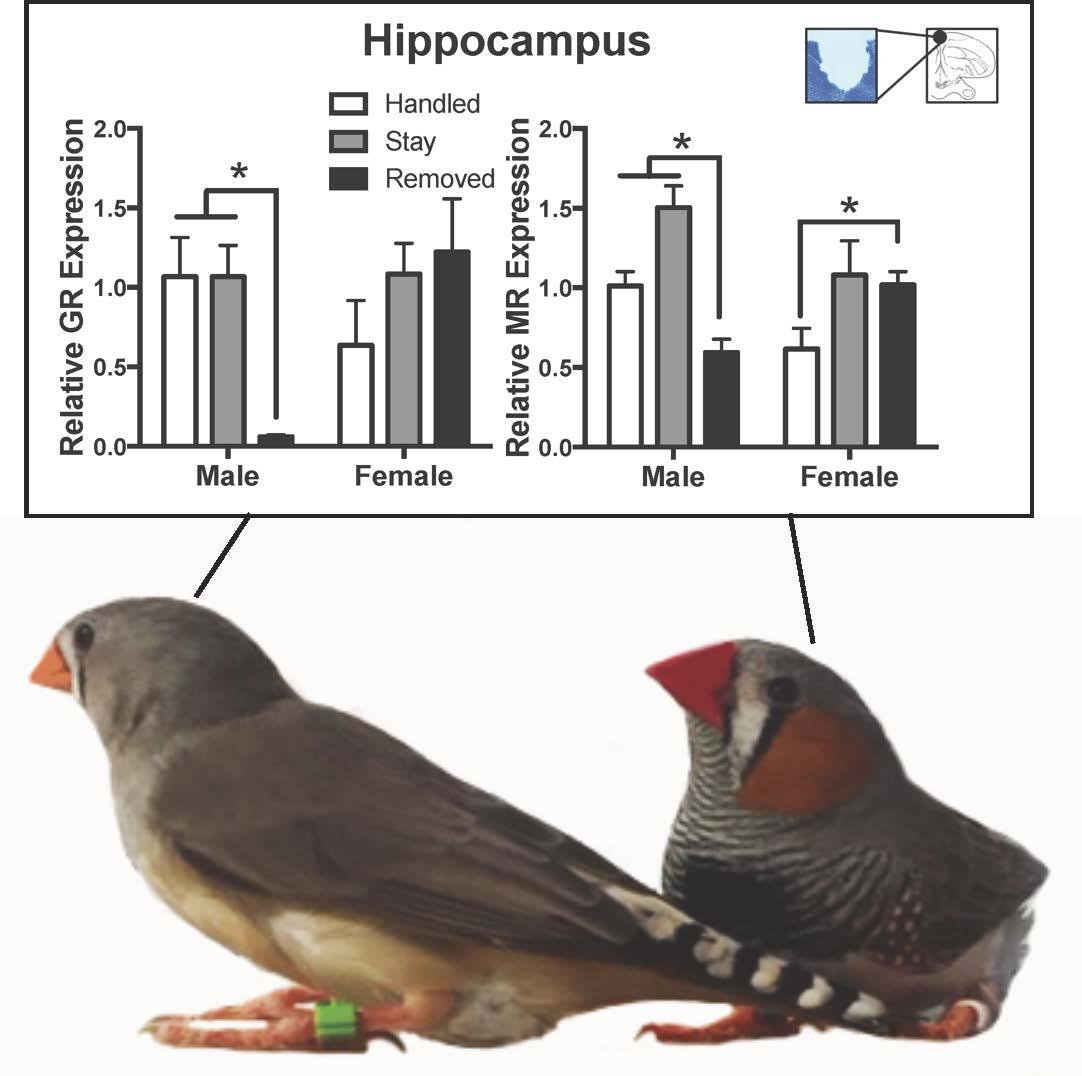New Research Shows Physiological Effects of Mate Separation in Birds
A new study from researchers at the University of Maryland—which was initiated when they were at Johns Hopkins University—reveals the distinct physiological differences in the effects of mate separation on male and female birds. These findings might help pave the way toward a deeper understanding of the ways in which male and female humans process separation from a mate on physical levels.
The lead authors of the study—published in the journal Hippocampus—areDr. Farrah Madison, a UMD research assistant professor of psychology,and Andrew J. Kesner, who was an undergraduate student at Johns Hopkins University when the study was initiated. The coauthors on the study are Dr. Gregory Ball, dean of UMD’s College of Behavioral and Social Sciences and a professor of psychology and of biology, and Dr. Beau A. Alward, who is now a post-doctoral fellow at Stanford University.
Zebra Finch/Mate Study Overview
Zebra finches are the subjects of the study; like many other avian species, they are monogamous, biparental, and form life-long pair bonds. In addition to these traits, the researchers chose to work with zebra finches for this study in part because the species is known to exhibit many sex differences in both brain and behavior.
The research team investigated the effects of mate pair separation by measuring and evaluating changes in gene expression in the brain that are related to the functioning of stress hormones. They measured the effects of mate pair separation on circulating corticosterone (the main stress hormone in birds) concentrations, as well as changes in mineralocorticoid receptor (MR), glucocorticoid receptor (GR), and corticotropin releasing hormone (CRH) gene expression in the hippocampus and hypothalamus in both male and female finches. The MR and GR are receptor proteins that regulate the secretion of these adrenal hormones through a feedback system between hormone concentrations in the blood and the brain.
Birds were assessed in three scenarios: (1) the male or female being removed from their respective mate and placed in a cage with a new opposite sex conspecific and stimulus female (group labeled “removed” in the figure below); (2) the male or female remaining with their mate, but a new stimulus female was introduced (group labeled “stay” in the figure); or (3) the subjects were handled but not separated from their mate or the stimulus female (group labeled “handled” in the figure).

Notable Findings
As had been observed previously, the researchers observed significant increases in plasma corticosterone concentrations in response to both mate pair and stimulus female separation in both males and females. Thus, a disruption of the social setting in the birds can be viewed as stressful based these increases in stress hormone secretion.
No effects of treatment on gene expression were observed in the hypothalamus—the region in the forebrain of both birds and humans that links the nervous system to the endocrine system. But in the hippocampus, the region that sits at the top of the brain in birds and that plays a significant role in memory, spatial awareness and the regulation of psychological hormone responses to stress in all vertebrates, there were pronounced effects of treatment on gene expression. In the hippocampus, females exhibited a significant up regulation in hippocampal MR—but not GR mRNA—whereas males exhibited a significant down regulation of both hippocampal MR and GR mRNA in response to mate pair separation. Such decreases in receptor expression in the human hippocampus are associated with depression.
“This sex-dependent response to mate loss suggests that male and female zebra finches may perceive the stressful effects of mate pair separation in different ways, and MRs may influence behavioral flexibility in females,” Madison said. “This is especially interesting, as we already know that in avian species, females are more likely to leave a pair than males.”
Possible Future Implications
“Our results potentially shed light on neurobiological mechanisms that factor into the observed sex differences in how males and females of other species—including perhaps humans—perceive and respond to stressful psychological events such as the death of a spouse, divorce, or marital separation,” Ball said. “For example, in humans, men have been shown to be more apt to demonstrate negative health outcomes in response to the dissolution of a marriage than women, suggesting that women cope with divorce better than men.”
“While it is still too early, to extrapolate possible implications of this study on parallel findings in human subjects, our project could potentially lay some groundwork in such an examination,” Madison said.
Published on Tue, May 15, 2018 - 10:48AM



